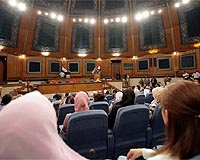| . |  |
. |
Baghdad (UPI) Dec 8, 2009 Tuesday's surge of spectacular car bombings across Baghdad that killed more than 100 people, the third such wave since August, underlines the inadequacies of Iraq's security apparatus and the deep-rooted opposition to the recent shift toward Iranian-friendly Shiite politics. The hourlong coordinated bombing spree came as Iraq's Presidency Council was expected to announce a date for parliamentary elections. The violence was clearly intended to undermine the electoral prospects of Prime Minister Nouri al-Maliki, a Shiite close to Tehran. In recent months Maliki has consolidated direct control of the various branches of Iraq's 600,000-strong security apparatus, and major security breaches, such as Tuesday's bombings, damage his portrayal of himself as the quintessential Arab strongman. His government is having to take increasing responsibility for security as the U.S. military withdrawal that began in June continues with unreliable Iraqi forces having to pick up the slack. Maliki has publicly blamed al-Qaida and the remnants of Saddam Hussein's Baath Party for the multiple bombings, including the suicide attacks against government ministries in Baghdad's heavily guarded "Green Zone" on Aug. 19 and Oct. 25 in which some 280 people perished. He has yet to produce concrete evidence of this, despite having alleged suspects confessing their links to the successor to the Baath, al-Awda, or The Return, on state television, or his accusations that neighboring Syria provides sanctuary for those who plan the bombings. Damascus has denied those charges and has recalled its ambassador, as has Maliki. But there is some evidence there are factions within Syria's large intelligence system who are supporting the Baathists because they oppose Iranian domination in Iraq. At the same time, the move toward a Shiite-dominated political system that marginalizes and frequently murders nationalists of the Sunni minority, the backbone of Saddam's repressive regime, has incensed the Sunnis. Maliki's refusal to integrate the tens of thousands of Sunnis, collectively known as The Awakening, who abandoned the insurgency and joined the Americans in 2007-08 to fight their erstwhile comrades, into the security forces has sharpened sectarian rivalries even further. Several of those who led the defections have been killed. Some were clearly the victims of al-Qaida settling old scores, but others were reportedly slain by Maliki's death squads. Apart from al-Qaida and other insurgents, Maliki is also up against rival Shiites in the planned elections. These had been scheduled for mid-January but have been put back to a date as yet unspecified because of sectarian feuding in Parliament. These rivals, many of whom were partners in Maliki's coalition government until they broke with him in the summer and formed the Iraqi National Alliance, have as much interest in undercutting his electoral prospects as the insurgents. Maliki, who has stitched together a broad-based alliance that includes Sunnis as well Shiite tribes from the oil-rich south, is gambling all he has on winning the election and continuing as prime minister. But, as the bombings show, he has an uphill struggle on his hands. The high-profile bombings in central Baghdad can be expected to continue, even if these attacks are weeks apart. "The upcoming election offers a powerful forum where insurgent attacks could provide the greatest political damage to the Iraqi government, particularly Maliki's prospects for retaining office," according to analyst Ramzi Mardini of the Washington-based Jamestown Foundation think tank. The intensity of the bombings appears to be escalating. Security analysts expect them to intensify in the weeks ahead. Political assassinations are also expected to increase. Recent discoveries of large weapons caches in southern Iraq indicate that Shiite militias are stockpiling arms. According to Iraqi security sources, many bear Iranian manufacturing stamps showing they were produced as late as 2008, following Maliki's Lion's Roar offensive against his Shiite rivals in spring of that year, primarily the forces of firebrand cleric Moqtada Sadr. These Shiite militias, including Sadr's, are recruiting heavily with an eye to undermining Maliki's electoral prospects. Iraq's Sunni-dominated Arab neighbors, particularly Saudi Arabia and Jordan, are also likely to be a factor. None has any great regard for Maliki or his pro-Iranian policies. Their intelligence agencies, like Syria's, are all operating inside Iraq to curb Iranian influence and support the beleaguered Sunnis. These regimes "may feel compelled to undermine Maliki's electoral advantages ahead of the parliamentary election," Mardini said, "as his rhetoric and consolidation of power has been of some concern to them lately."
Share This Article With Planet Earth
Related Links Iraq: The first technology war of the 21st century
 Iraq general election to be held on March 7
Iraq general election to be held on March 7Baghdad (AFP) Dec 8, 2009 Iraq's second general election since Saddam Hussein was overthrown will be held on March 7, almost six weeks later than the originally planned date of mid-January, officials said on Tuesday. The announcement came two days after MPs struck a last-minute deal to get the poll back on track, but the news was overshadowed by five massive car bombs in Baghdad that killed 127 people and wounded 448 ... read more |
|
| The content herein, unless otherwise known to be public domain, are Copyright 1995-2009 - SpaceDaily. AFP and UPI Wire Stories are copyright Agence France-Presse and United Press International. ESA Portal Reports are copyright European Space Agency. All NASA sourced material is public domain. Additional copyrights may apply in whole or part to other bona fide parties. Advertising does not imply endorsement,agreement or approval of any opinions, statements or information provided by SpaceDaily on any Web page published or hosted by SpaceDaily. Privacy Statement |